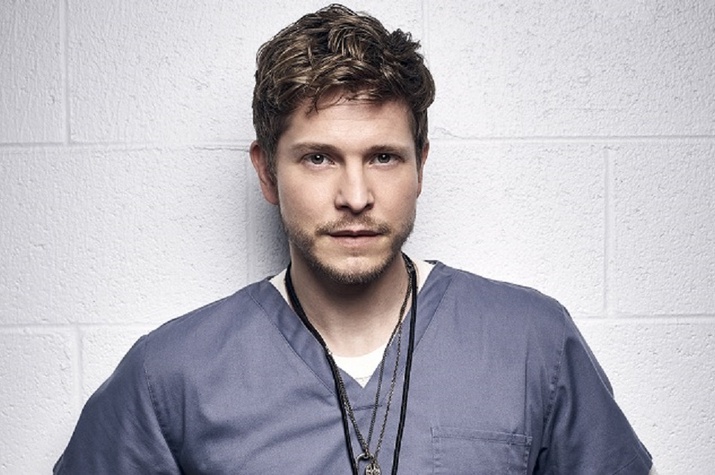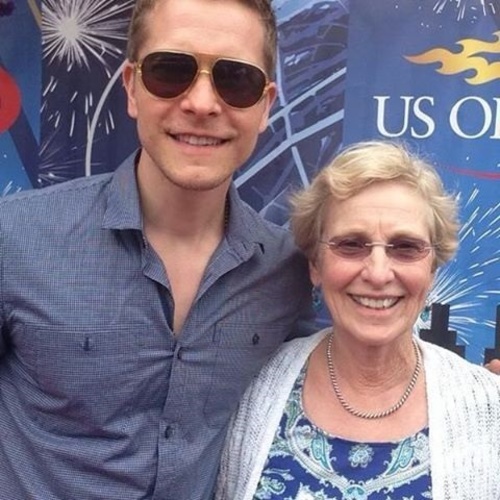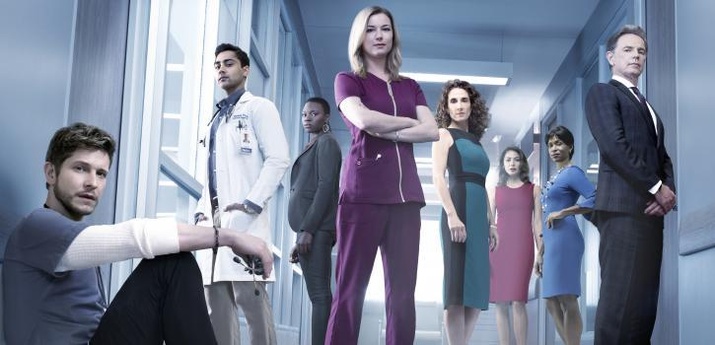Don't miss any stories → Follow Tennis View
FollowMatt Czuchry Thrives under Pressure in Tennis and Television
Matt Czuchry never met a challenge he didn’t conquer. Or at least it sure feels that way from the outside looking in. You may know him best as Cary Agos on The Good Wife or as Logan Huntzberger on The Gilmore Girls, but you probably don’t know that Matt is a former junior, high school, and college tennis player with some serious bona fides in the sport.
Talking to the successful actor, it becomes clear pretty quickly that he lives to overcome challenges. Like in high school, when a certain player beat him six times in a row? That’s the guy Matt defeated on his way to winning the State Championship his senior year when he became the first person from East Tennessee to earn that title. Unsurprisingly, Matt leveraged his mental game and tenacity to work around the… let’s call them deficiencies in his technical strokes (“My backhand was really terrible!,” he cheerfully admits). As a player at the College of Charleston, Matt thrived on the pressure of having the team’s win come down to his match. His cool head and leadership skills made him a natural fit for the role of team captain.

Reflecting fondly on his formative tennis years, Matt talks about how supportive his parents were and still appreciates the special connection he formed with them as they drove him across the South to junior tennis commitments. He doesn’t get out on the courts much anymore because he simply can’t devote the time to playing at the level he reached during his college tennis days. But even when he doesn’t pick up a racket for long stretches of time, so many of the benefits of having played tennis are ever-present, such as the lifelong friends he made and the life lessons about dedication and perseverance that his coaches taught him.
Matt applied those very lessons when he took on the challenge of playing a doctor in his starring role as Conrad Hawkins on FOX’s new medical drama, The Resident. He dove deep into his research by reading books, listening to podcasts, and watching documentaries, as well as interviewing and even shadowing doctors. He calls the preparation process “fascinating,” which may be an understatement. And even though he’s not crazy about needles or having his blood drawn, Matt stepped into the role of third-year resident with ease, displaying the headstrong confidence of a doctor and military veteran whose medical skills were forged on literal battlefields.
The Resident takes an uncommon approach to the medical genre by exposing the business side of the American healthcare system, such as the excruciating decision between saving one person’s life with a costly treatment and using that money to help more people, or wrestling with insurance companies to get a surgery approved. This turns out to be an excellent vehicle to showcase the nuanced craft that Matt has developed as an actor. He brings out the humanity in Conrad Hawkins and carves out depth in the role, just as he did when he turned Cary Agos into a fan favorite on The Good Wife. He is the master of microexpressions, and some of the show’s best moments are when Matt lets an emotion dance across his face for a fleeting second before his character returns to the dark place where he mostly resides.
Read on for the conversation between Matt Czuchry and Tennis View’s Tracey DeFrancesco to learn more about how tennis prepared him to become an actor, the challenges of being a college athlete, his unique connection to Pete Sampras, and what to expect on The Resident this season.
Tennis View: I read that you played several sports growing up, but didn’t really focus on tennis until 8th grade. Why did you decide to make tennis your primary sport?
Matt Czuchry: It was actually probably 8th or 9th grade, my freshman year in high school. The reason it turned into my primary sport was that I had started tennis later in my life – soccer and basketball were earlier in my life – and with tennis, I was the worst at that particular sport, so I wanted the challenge of dedicating myself to get better at that particular sport. That’s when I made the decision to focus completely on tennis.
TV: You didn’t just get better, you earned a college scholarship to play tennis.
MC: My senior year in high school I ended up winning the Tennessee State Championship, which is one of my fondest memories. I was the first person in East Tennessee, from that section of Tennessee, to win the championship. When I was in high school, that was always a dream of mine that I didn’t think was achievable, especially coming from East Tennessee where no one had won it before, so for me, that was a very special accomplishment.
Then I went to the College of Charleston on a tennis scholarship. I always loved the pressure of being the last person on the court when the team would either win or lose if you won or lost – I loved the feeling of that pressure of my team depending on me. I feel in my career as an actor that weight of trying to perform under pressure, needing to create a performance day in and day out despite the obstacles. That’s where tennis and my career meld, is that performance under pressure which I always loved playing tennis.
In college I double majored in history and political science, and for me the experience was: you play a match that doesn’t finish until 10 o’clock at night, and you have to go home and write a paper that evening when you’re exhausted, and then in the morning you have to get up for an 8 o’clock class. With that combination of tennis and academics in college, really you’re never fully at your best when you go out on the courts to play because there’s so many obstacles. With acting as well, there’s never a time when you’re 100%, you may have gotten changes last minute or the lack of sleep, or just the amount of material that you have to prepare. So I think that the idea that being comfortable with always being overwhelmed and actually embracing the pressure and being overwhelmed is something that applies both to tennis and my career as an actor. What playing tennis taught me was to try to find a way with being comfortable with always being overwhelmed.

TV: I’ve seen pictures of you at the U. S. Open. Are you a fan of the pro tour?
MC: I am. I always have been. When I was a kid I always wanted Agassi’s shoes. I loved Yannick Noah as a player when I was a kid so I would wear Le Coq Sportif because that’s what he wore. I loved Michael Chang as a player because he grinded it out in matches. Loved Pete Sampras, as well. Currently, Roger Federer, seeing him play in person and hearing all the great things I’ve heard about him as a person.
I would go to tennis camps in the summer in Cape Cod [run by] Tim Gullikson, who of course coached Pete Sampras. I went there for two summers in a row and he was an incredible coach and a great spirit. Tim Gullikson would be talking to Pete Sampras and he would be like, “Oh I was just on the phone with Pete and he’s such a great guy.” Of course, for me as a kid seeing that, I would go to those camps when I was in high school, it really inspired me. That U. S. Open when Tim Gullikson had passed away and Pete Sampras was on the court, emotional, I certainly felt that connection with him in that moment.
TV: What did you take from your experience playing tennis?
MC: It was the friendships I developed with my teammates who are friends for life and also my coaches – my coach Pete when I was a kid and my coach Angelo at the College of Charleston. The life lessons that you learn and the friendships you make through the sport, for me are lasting forever. I mentioned a little bit about the pressure and trying to be comfortable with being overwhelmed, the dedication and the perseverance that you learn from the sport that you can apply to your life, and the friendships that you make from the sport, and the lessons I learned from my coaches. I would say that, whether it be to kids or to anybody who’s looking to take up the sport, there are those friendships you can develop and those life lessons you can apply whether it be your personal or professional life, that go beyond the sport.
My strokes as a tennis player were not that good at all. My backhand was terrible! For me, the mental aspects of the game were what I thrived on. Being under pressure, playing one point at a time, and having that proper perspective and moving on from point to point.
TV: Your new show, The Resident, is taking a different approach to the genre of medical dramas and exposing the business aspect of medicine, some of which is probably a revelation to a lot of people. What’s the most surprising thing about healthcare or hospitals that you learned in the course of preparing for and filming this show?
MC: When I read the pilot, I wasn’t surprised because I’ve had personal experiences, whether it be my extended family or friends who have faced the issues that we discuss within the show. So for me, it wasn’t more surprise but “Oh, I have had personal connections with these themes so imagine how many other people would have connections with these themes as well.” That is what drew me to it, that although it was a different approach to the medical genre, it was something that I personally connected to and knew that it hadn’t been addressed in this way.
TV: How does your character’s background as a veteran impact his daily life?
MC: It’s kind of reflected in his confidence that he has. Being the third-year resident, he’s team leader, and so the way that he mentors his team or handles other doctors and situations is directly related to his experiences, in terms of the seat-of-the-pants medicine that he had to do on the battlefield where you don’t have all the tools that you necessarily would have elsewhere and you have to make split decisions. With the military, you’re always feeling or preparing for complete chaos. That’s what Conrad tries to do with his team, is to insert chaos before the chaos actually happens. So much of who Conrad is comes from those experiences that he had in the military.

TV: The previews for when the show returns on February 26 look really intense. You’ve had some unique storylines for a medical drama so far, what should we expect to see the rest of the season?
MC: Thematically with Conrad, you see these big wins and big losses. So the audience is not sure what to expect from episode to episode because we kind of take a different approach. As you saw in episode four, a patient comes in, there’s a mix up of identity, the patient is not put in the proper channel so that patient dies. One of the major themes of the show is the wins and losses, and how the doctors process those wins and losses. For Conrad specifically, you see him with several major losses throughout the season that affect him emotionally and also affect his relationships with the nurses and doctors at the hospital, and how does he process those emotions with being fallible and making mistakes is something we’ll see develop over the course of the season.
Matt Czuchry stars in The Resident, airing Mondays at 9/8c on FOX










